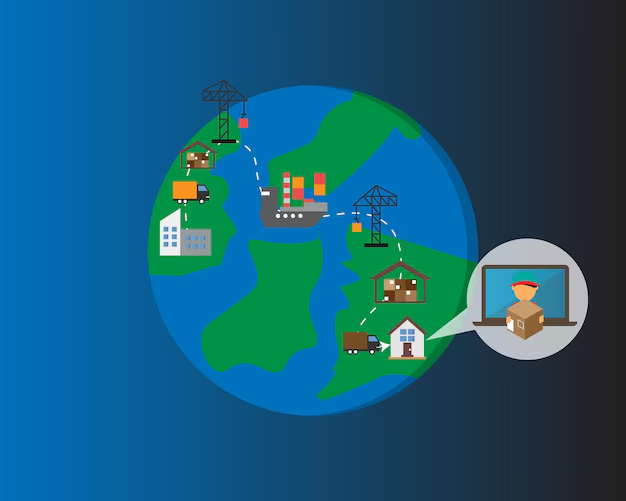Introduction
Have you ever taken note how something happening thousands of miles absent can all of a sudden influence the cost of your global supplies? It’s not magic—it’s the complex web of the worldwide economy at play. One little alters in another nation, and boom, your morning coffee or favorite nibble gets to be more expensive.

Take, for case, a political strife in a major oil-producing country. That can cause fuel costs to skyrocket, expanding transportation costs and making everything from vegetables to gadgets more costly. Or consider a characteristic calamity that disturbs trim generation; all of a sudden, the cost of fundamental products like rice or wheat spikes. Indeed something apparently arbitrary, like a transport getting stuck in a pivotal shipping path, can lead to delays and deficiencies, influencing supply chains worldwide.
In this article, I’ll plunge into the interesting world of worldwide occasions and their swell impacts on neighborhood markets. Whether it’s geopolitical pressures, financial approaches, or eccentric common calamities, we’ll investigate how these components interlace to shape the costs we see each day.
So, if you’ve ever pondered why your favorite nibble vanished or why your basic supply charge appears higher recently, the reply likely lies in the worldwide economy’s interconnected web. Let’s reveal the associations together!
The Ripple Effect: When the World Sneezes
1. Trade Wars: The World’s Expensive Argument
Trade wars aren’t just about two countries arguing over stuff. When the US and China started taxing each other’s goods (called tariffs, but honestly, who even uses that word?), it made everything from toys to tech more expensive for the rest of us.
Impact Locally: Businesses relying on imports had to charge more, which annoyed their customers. Some even stopped stocking certain products.
Relatable Example: My neighbor, who owns a gadget shop, once said, “Explaining tariffs to customers feels like trying to explain why pizza without cheese isn’t really pizza.”
Off-Topic Thought: If there’s ever a trade war over coffee, I’d probably riot. No coffee, no sanity.

2. Natural Disasters: It’s Not Just Their Problem
A hurricane in one country or a flood in another can totally mess up global supply chains. Remember when floods in Asia disrupted hard drive production? Suddenly, laptops were either out of stock or ridiculously expensive.
Impact Locally: Shops couldn’t meet demands, and consumers had to wait longer or pay more.
Funny Thought: Who knew bad weather could ruin my plans to upgrade my gaming setup?
Weird Events That Hit Too Close to Home
1. The Ever Given Ship Drama
Ah, the Ever Given. That giant ship got stuck in the Suez Canal, creating the most random global crisis ever. While the memes were hilarious, businesses were panicking.
Impact Locally: Products that came through that trade route, like clothes and furniture, were delayed for weeks. Prices also went up because, of course, they did.
Relatable Thought: It’s like ordering pizza and the delivery guy decides to take a nap mid-route.
2. Brexit: Breaking Up Is Hard
The UK deciding to leave the EU wasn’t just their issue—it sent shockwaves worldwide. Businesses everywhere had to adapt to new rules, more paperwork, and a lot of confusion.
Impact Locally: Imported goods from Europe became more expensive, and companies faced delays due to extra paperwork.
Off-Topic Musing: Brexit feels like when you leave a group chat but still need to borrow someone’s Netflix password. Awkward, but I make it work.
Tech, Pandemics, and the Rest
1. Tech Breakthroughs: The Cool Stuff Isn’t Always Easy
When a new tech like 5G comes around, it’s exciting but also creates unexpected problems. Cities benefit first, but rural areas often feel left out.
Impact Locally: Businesses in urban areas thrive, while rural areas struggle to keep up.
Random Thought: If 5G makes my internet faster, does that mean my cat videos will load before I even click play? Sounds futuristic.
2. Pandemics: When the World Presses Pause
COVID-19 didn’t just change how I live—it flipped markets upside down. Stores ran out of essentials, businesses shut down, and suddenly, everything went digital.
Impact on Local Markets:
Gyms offered Zoom workouts (somehow, it’s even harder to exercise at home).
Restaurants became delivery experts overnight.
Toilet paper somehow became a luxury item (still confused about that one).
Relatable Anecdote: My favorite bakery started selling “DIY cake kits” during the lockdown. I baked one, and it looked like something out of a horror movie. But hey, it tasted okay!
Lessons for Everyday People and Investors
1. Follow the Trends (But Not Too Much)
Knowing what’s happening in the world helps you understand why things cost more—or why they suddenly disappear.
Pro Tip: Read news from trusted sources, but don’t fall for dramatic headlines. If it says “Markets Are Crashing,” they probably aren’t.
2. In one basket Don’t Put All Your Eggs.
This saying applies to both shopping and investing. Diversify your risks so that one bad event doesn’t ruin everything.
Example: Renewable energy stocks often do well when oil prices drop, so having a mix of investments makes sense.
3. Stay Flexible
The world’s unpredictable. One minute, everything’s fine; the next, there’s a ship stuck or a new virus making headlines. Be prepared to adjust your habits and strategies as needed.
Final Thoughts:
Global occasions aren’t fair far off headlines—they specifically shape the costs we pay and the choices we make each single day. From the fetched of your goods to the accessibility of your favorite items, everything is associated in a web of worldwide supply chains, worldwide arrangements, and advertises patterns. Whether it’s a exchange war between nations, a widespread disturbing fabricating and coordination, or indeed something as unusual as a monster transport blocking a significant shipping path, these events send swells that inevitably reach us.
It’s captivating (and a small baffling) to think approximately how one unforeseen occasion thousands of miles absent can have such a substantial affect on our lives. The world is more interconnected than ever, and whereas this brings gigantic openings, it moreover implies we feel the impacts of disturbances more intensely.
So, the following time you take note your basic supply charge inching higher or your online arrange taking ages to arrive, take a minute to consider the greater picture. Some place, something interesting is likely happening—whether it’s a political standoff, a normal catastrophe, or a irregular disaster. Understanding this interconnecting doesn’t fair make us more educated shoppers; it too makes a difference us appreciate how energetic and unusual the worldwide economy genuinely is.
